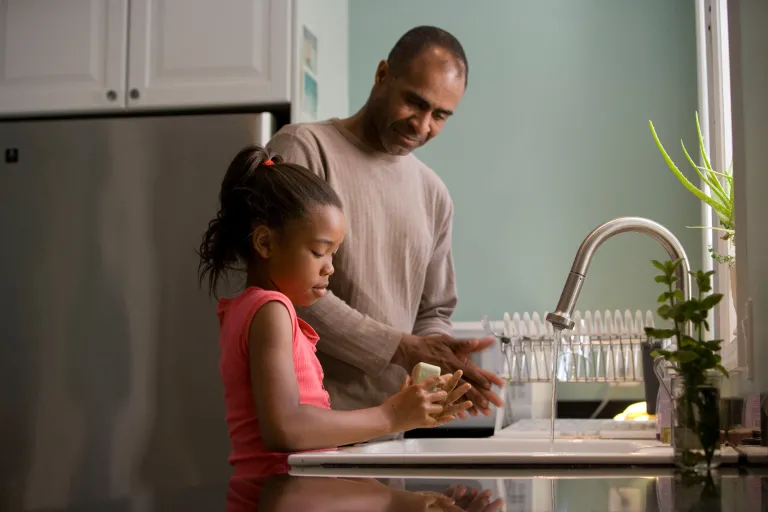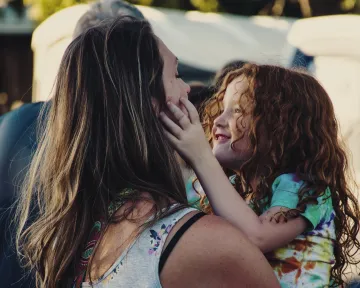
Telling your children that you’re separating can be the thing you most dread. You may fear your children’s reactions. It may also make your separation all the more real for you. Your separation is a life-changing event for your children. Explaining to your children what’s happening and why is unlikely ever to be easy. You can though find ways to do it which will help your children feel supported and that their needs are being met.
Tips for telling children you're separating
Your children’s needs will depend upon their age and development, but you may find the following advice for breaking the news of your separation helpful:
- Avoid giving your children details they don’t need, such as information about affairs.
- Use language your children will understand.
- Reassure your children that it’s OK to be upset and use words and cuddles to comfort. Let them know you both still love them and your separation is not their fault.
- Describe how your children’s world will change from their point of view, e.g. “Daddy will still pick you up from school but won’t be here to put you to bed.”
- Don’t be afraid to say you don’t know the answer to something. You can tell your children you’ll find out, or that when you know you’ll tell them.
- Let them know they can talk to you again if they want to, or ask questions at a later time.
It can help to remain in familiar surroundings after you've told your children about your separation, and for both parents to be around afterwards.
If one parent is leaving, tell the children when this will be, where they’ll be going, when they’ll see them again and how they can be contacted when they’re not around.
It can help to think about yourself at the same age your child is now. Try working through these questions and plan what the ‘child you’ would have preferred:
- What were your favourite hobbies or activities?
- How did you communicate with people – were you a chatty or a quiet child?
- Were you tactile or reserved?
- Were you sensitive or unfazed by emotional situations?
Now imagine what you as a young child would need, want or like from an adult that was trying to talk to you.
Engaging with your ‘child self’ in this way, may help you to engage with what your child wants when you come to talking with them about difficult topics.
Telling young children you're separating
The age of your children will affect how you talk to them. You may find the following helpful for talking to young children:
- Plan to be in familiar surrounding, where they feel comfortable.
- Aim for “little but often”. It can be hard for young children to concentrate.
- Offer games, drawing or another play activity for your children to keep their eyes on while they talk to you. This can also help you manage the length of your conversation.
- Help your children understand emotions by using physical descriptions. For example, they may understand “frustrated” or “worried” better if they're described as a tummy ache, or a twisting, scrunching feeling.
- Get creative. If it’s hard for your children to use words to identify or describe their feelings you could, for example, ask them to do a drawing or to act out their feelings. Comment on what they do and what you like about it. Say if you feel the same too.
- Sum up what your children say to check you’ve understood them properly and show you’re really listening.
- Let your children know that whatever they’re feeling it’s OK.
- Avoid speaking badly of your children’s other parent. It may put them off talking to you.
Talking to teenagers about separating
Even without dealing with their parents’ separation, teenagers have to cope with a lot. The teenage years are a time of great change – in friendships and feelings and, of course, hormones. So there’s a lot going on in their lives already! Meanwhile, heavy demands are often being made in school, college or university.
It can be useful to remember this when you talk to your teenager. Their reaction to your separation (or other things happening at a similar time) may be surprising or challenging. Try not to be disheartened if it’s not a positive experience.
Many teenagers find it hard to express their feelings. Still, your teenager needs to know that you’re there for them when they’re ready to talk – and you need to be prepared for that moment.
Preparing to talk
Before talking to your teenager, be realistic about what you want to achieve. Work together with their other parent, if possible. Teenagers will respect you both more when you're saying the same things.
The following can help you prepare for talking:
- Think of three key messages you'd like to get across. For example: “It’s OK to come and talk to me anytime.”
- Consider what potential hurdles might affect getting these messages across.
- Jot down the three hurdles you fear most.
- Plan how you can react to them in a positive way.
Remember and reflect
It can be useful to remember that you were a teenager once too. Take some time to think about your own teenage struggles and what might have helped you then.
You may also want to consider the kind of relationship you have with your teenager already. Do they open up and come to you for support, or are they more comfortable at a distance?
Having regularly conversations can help
Having regular conversations with your teenager about how they’re feeling and coping with your separation can help them talk about problems when they're ready. During the conversation try to do the following things to make talking to your teenager easier:
- Find a neutral space, for example out walking or in the car (remember some teenagers find eye contact awkward).
- Use open questions (those requiring more than yes/no answers). Asking, “How do you feel about ”¦?”allows your teenager to express themselves.
- Accept what you hear, even if it makes you uncomfortable. Only they know how they truly feel.
- Don’t feel you have to offer explanations or solutions.
- Try to avoid negative or critical words about your ex. Expect your teenager’s feelings toward their other parent to be different to yours.
Continual support for your children
When things settle a little, reflect on how talking to your children went.
- What did you do that you think helped?
- What would you do differently when you speak to your children about your separation again?
- Did they ask you questions you couldn’t answer?
Make a note of the questions you couldn’t answer right now and remember to revisit them with your children. Be prepared to repeat what you’ve said about separating, they may need reassuring many times before they’re able to come to terms with the news.
How we can help
If you’re looking for support with your relationships, we can help. We offer a range of ways to speak with a trained relationship expert including ongoing counselling, 30 minute web and phone chats, and one session therapy.
Find out which service is right for you
How you can help
Have you found this advice helpful? Make a donation to help us reach more people and continue supporting the nation’s relationships:
Can't afford to donate? We understand. Instead, we ask that you leave us a 5 star review on Trustpilot.


